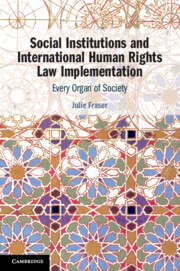Book contents
- Social Institutions and International Human Rights Law Implementation
- Social Institutions and International Human Rights Law Implementation
- Copyright page
- Dedication
- Contents
- Foreword
- Acknowledgements
- 1 Introduction: The Challenge of Human Rights Implementation
- 2 Human Rights and Their Cultural Connection
- 3 Domestic Implementation of International Human Rights Treaties: Legislative and Other Effective Measures
- 4 Domestic Implementation of International Human Rights Treaties: The Role of Public and Private Actors
- 5 Role of Islamic Law and Institutions in Implementing Women’s Right to Family Planning in Indonesia
- 6 Conclusions: Social Institutions and the Future of Domestic Human Rights Implementation
- Select Bibliography
- Index
5 - Role of Islamic Law and Institutions in Implementing Women’s Right to Family Planning in Indonesia
Published online by Cambridge University Press: 04 September 2020
- Social Institutions and International Human Rights Law Implementation
- Social Institutions and International Human Rights Law Implementation
- Copyright page
- Dedication
- Contents
- Foreword
- Acknowledgements
- 1 Introduction: The Challenge of Human Rights Implementation
- 2 Human Rights and Their Cultural Connection
- 3 Domestic Implementation of International Human Rights Treaties: Legislative and Other Effective Measures
- 4 Domestic Implementation of International Human Rights Treaties: The Role of Public and Private Actors
- 5 Role of Islamic Law and Institutions in Implementing Women’s Right to Family Planning in Indonesia
- 6 Conclusions: Social Institutions and the Future of Domestic Human Rights Implementation
- Select Bibliography
- Index
Summary
Chapter 5 explores the role of social institutions in human rights implementation by way of a case study. Using the example of Islamic law and organisations as social institutions, the study examines their role in implementing women’s right to family planning in Indonesia. The study exposes the ways in which Islamic law and organisations were involved in Indonesia’s family planning programme, and assesses their role and contribution as perceived by local actors. Chapter 5 pays special attention to the agency of Muslim reformists (particularly ‘Muslim feminists’) in offering reinterpretations of Islamic law that promote women’s health and equality. The study concludes that Islam was instrumental to the programme’s success, and reflects normatively on whether/to what extent states should engage social institutions in implementing their human rights treaty obligations. The chapter then evaluates and critiques the approach to Islam taken by the UN treaty bodies in their supervision of Indonesia’s domestic implementation.
Keywords
- Type
- Chapter
- Information
- Social Institutions and International Human Rights Law ImplementationEvery Organ of Society, pp. 164 - 267Publisher: Cambridge University PressPrint publication year: 2020

